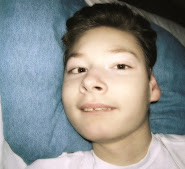And the winner is....
Tyler was doing so well after a few days, that I asked if we could go home. The pathology hadn't come back yet, and one of the doctors let it slip that they were worried it might be a sarcoma. We were staying until the results came back in case more surgery was needed.
On Sunday, we were informed that Tyler has a desmoid tumor. It is benign, but because it is so large, it puts pressure on his organs. We were told of three treatment options: surgery, radiation then surgery, or chemotherapy. As I did my research, I learned that none of these are very great options. Surgery, or complete removal of the tumor, has a 70% recurrence rate if they don't get all of it even down to a microscopic level - this would mean the removal of 2 inches all around the tumor and then a mesh insert to replace the muscle and keep his organs in his gut. Radiation is not something they usually do in abdominal desmoids because of the size of the area that needs to be irradiated and the risk of damage to internal structures. Chemotherapy can be very effective, but there are side effects and risks to the patient's immune system.
On Monday, Tyler was one of the most popular stops for doctors on rounds. Ahhh, the joys of care in a teaching hospital. Desmoids are very rare (2-4 per million per year), only one of the General Surgeons had seen one and that was five years ago. It is even more rare for a young adult male to have one in his stomach. Most desmoids occur in the joints/limbs, and those that occur in the abdomen are usually related to a pregnancy/c-section or familial adenomatous polyposis (FAP - a genetic abnormality) - neither one of these applied to Tyler. We were told that they usually grow slowly and that we would be going home and returning in 6 weeks for a post-surgical followup.
We actually went through three different treatment plans within 30 minutes. First, Neurosurgery came in and said they would be speaking with surgery/pathology and wanted an MRI . Next, general surgery said they didn't want to remove the tumor because it would require the removal of his entire lower right belly wall. Finally, Rehab and Neurosurgery scheduled and MRI and wanted to keep him for observation because he would be sedated.
In only 10 minutes, a nurse practioner came in announced the MRI had been scrapped - too much inflamation. Instead, staple removal in one week and a follow up in one month.
This surgery was the first time I realized just how uncertain life is, and how things can change so quickly. I decided to make a list of people I would want contacted if anything should happen to him. It is best to do that sort of thing when there is no danger of it happening soon. I think that a crisis is the worst time to have to plan anything. Now that I've made up a list, I've tucked it away and hope it won't be necessary for several more years.



No comments:
Post a Comment